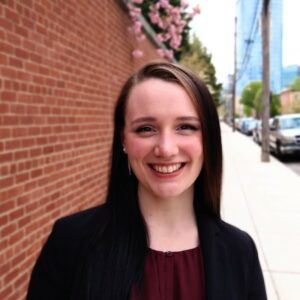In the spring of 2021, 44 PhD students from a range of academic disciplines at Penn participated virtually in Career Services’ PhD Career Exploration Fellowship (CEF) program, where they were matched with a host organization to learn about different careers beyond academia. Bonnie Douglas, a PhD candidate in Immunology, was placed as a Fellow with the Franklin Institute. Read about Bonnie’s experience in the CEF below!

Describe your experience working with your host:
I had the privilege of working with Dr. Jayatri Das, Chief Bioscientist at the Franklin Institute, during my Career Exploration Fellowship. Dr. Das was incredibly enthusiastic and welcoming from the outset, and included me in weekly meetings with the Science and Education (S&E) Team. Through these meetings, I was able to learn about day-to-day operations at the museum and get to know other professionals in the informal science education field. I was also fortunate to work on three projects with Dr. Das and the S&E Team, which included: writing a blog post about Lady Mary Wortley Montagu and the history of vaccines, helping to organize a public forum on diversity and inclusion in clinical trials, and developing an at-home paper-making activity for the Franklin@Home website. This experience helped affirm my interests in science education and outreach, and I am incredibly grateful to Dr. Das, the S&E Team, and the Career Center for making this such an amazing experience!
What did you learn from this opportunity (about yourself, about career fields, the job search, etc.)?
Prior to this experience, I had developed an interest in science outreach and education by volunteering at various outreach events and programs. My experience at the Franklin Institute definitely cemented my interest in pursuing outreach and informal education in STEM as a career, but it also allowed me to learn more about opportunities that are available in these fields and the tasks associated with different job titles. Contributing to different projects led me to appreciate my enjoyment of science communication in addition to outreach and education, and I plan to expand my job search to positions in science writing and communication now as well. Talking to other professionals in this field helped me realize that few career trajectories are linear, and that it’s okay to try different things that interest you. Altogether, this experience made me feel more empowered to apply for jobs and confident in my ability to transfer the skills I’ve learned during my PhD to careers outside of academic bench science.
How does your CEF experience benefit your future career plans?
Participating in the CEF helped me grow my professional network and gain a better understanding of the jobs and organizations to which I would like to apply post-graduation. Working with my host on projects also helped me develop skills relevant for a career in science outreach and informal education and gain a richer understanding of myself and my interests. Finally, the workshops organized by the CEF were essential in helping me craft my LinkedIn profile and update my resume.
What was the most valuable part of your CEF experience?
It’s hard to pick just one thing! I learned so much from Dr. Das, the S&E Team, and the Career Center this semester. However, I think the most valuable thing I gained from this experience was confidence. Prior to participating in the CEF, I felt very unsure of my chances on the job market and didn’t really know how to search for jobs that interested me. After spending time attending CEF workshops and talking with my host and other professionals at the Franklin Institute, I feel better able to identify and apply to jobs in the science outreach and informal education fields. I also feel more confident in my application materials after reviewing these with other CEF fellows and the Career Center. Lastly, this experience helped me realize that there are a wide variety of different jobs that I’m interested in, which has not only helped inform my job search but has also made me feel better about my chances of finding a job I love and am passionate about.
Top reason PhD students should apply to the CEF:
To gain a better understanding of your own career goals and the opportunities available to you outside the traditional academic route.




